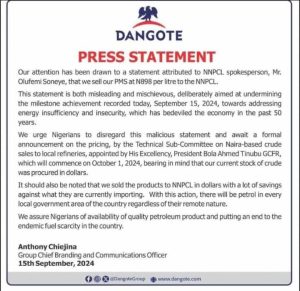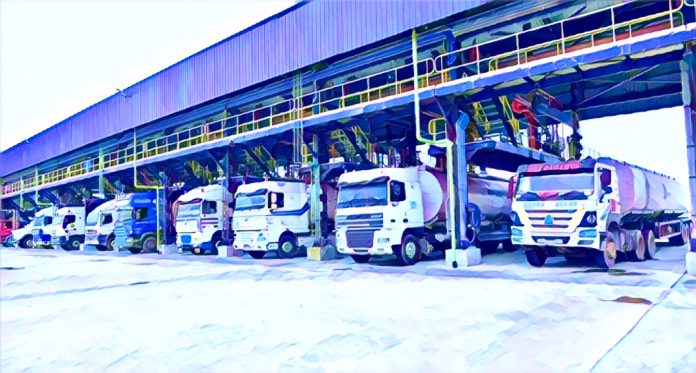Key Points
• Dangote Refinery rejects reports of selling petrol to NNPC at ₦898 per litre.
• The refinery clarifies that it has not yet begun selling petroleum products.
• Speculation over fuel pricing continues amid Nigeria’s fuel subsidy removal.
Dangote Industries has come out to dismiss the allegations made by the Nigerian National Petroleum Company Limited (NNPCL) on the price at which the company sells Premium Motor Spirit (PMS) to the national oil corporation. This came in response to some reports that have been making rounds in the media that the refinery has started selling petroleum products.
In the press release, Dangote categorically dismissed as false a statement credited to NNPCL’s spokesman, Mr Olufemi Soneye, that the refinery supplied petrol to NNPCL at ₦898 per litre.
Dangote Group, in a statement by its Group Chief Branding and Communications Officer, Anthony Chiejina, described the statement as misleading and mischievous, pointing out that the author of the fake news intended to dampen the spirit of the refinery which has been able to provide a solution to Nigeria’s age-long energy challenge.
The company highlighted the importance of the development that was made on September 15, 2024, as it was a turning point in Nigeria’s fight against energy insecurity that has been going on for more than five decades.

Further information on the price and availability
The press statement called on Nigerians to disregard the information and wait for the official announcement of the local crude sales pricing which is expected to be on the 1st of October, 2024. The pricing will be made based on the Technical Sub-Committee on Naira-based crude sales which has been formed by His Excellency President Bola Ahmed Tinubu GCFR.
Dangote also pointed out that the current stock of crude being supplied to the NNPCL was bought in dollars, which also dismissed the existence of a specific naira price at the moment.
Efforts made by Dangote to guarantee fuel supply across the country
To clear the air on the kind of relationship between them and NNPCL, Dangote said they were selling the product to NNPCL in dollars and not in naira and at a price that was far cheaper than the current importation cost.
With this move, the company has asserted that Nigeria as a whole will be able to save a lot of money. Dangote also rest assured that it would make sure that there would be petrol in every local government area of the country no matter the location as part of its strategic plan to ensure that Nigeria put an end to its fuel scarcity.
Possible petrol prices with Dangote refinery’s production
With Dangote Refinery set to commence the supply of refined petrol to the Nigerian market, there are questions on the effect on fuel prices in Nigeria. According to industry experts, the refinery production may lead to a decrease in petrol prices for the following reasons.
The domestic refining of crude will also reduce the high costs of importing fuel which include shipping and insurance costs which are recovered from consumers. This could lead to a reduction in the price of petrol, especially if the government decides to subsidize locally refined products or offer tax incentives.
However, the extent of this cost reduction may still be a function of the pricing regime between Dangote and NNPCL. This is because NNPCL may control the market price of petrol since it is the only buyer in the market. If the output of the refinery is being sold to NNPCL alone, this may limit competition within the market and may enable NNPCL to influence the prices to some extent.
Although Dangote has claimed that its supply of petrol to NNPCL will be cheaper than imported options, how these cost cuts will be passed down to the consumer has not been explained. There are however claims that
The role of the Dangote refinery
The Dangote Refinery which is based in Lagos is expected to revolutionize Nigeria’s petroleum sector. It can refine 650000 barrels of crude oil per day and therefore plays a critical role in the country’s efforts to decrease the amount of fuel that has to be imported. When it is fully commissioned, the refinery will be able to meet the local demand in Nigeria and even export refined products.
The effect of exclusivity on market competition
If Dangote is to remain the sole supplier to NNPCL, the effect may be both positive and negative. On the one hand, local production will undoubtedly minimize the dependence on costly imports, which is believed to stabilize the supply of fuel and even decrease the costs.
On the other hand, selling to NNPCL only may lead to low competition among the fuel marketers especially if other refineries do not increase their capacity to meet the local market demand.
At the moment, Nigeria’s market depends on imported petroleum products and local marketers adjust their prices according to the international market price. Since Dangote is now producing refined products locally, NNPCL could in theory dominate the market and dictate the price of products in the market. As much as the aim is to reduce the prices of petrol, lack of competition may have negative effects if not well addressed.
Dangote’s contribution to the market stability in the long run
While there are fears of market domination, Dangote’s refinery is believed to help in the long run to bring down the fuel prices. The refinery can produce 650000 barrels per day which will be sufficient to meet the local demand and even export some. This will not only help to cut costs but also earn foreign exchange earnings that will help stabilize the Naira which has been volatile in the past few months due to the current economic situation.
Furthermore, there is optimism that with the announcement of the new prices, the pricing structure will bring about a balance that will enable consumers to access petroleum products at reasonable prices while at the same time promoting competition in the market.
Looking ahead- a hopeful future for fuel prices
With the new leadership of President Bola Tinubu in Nigeria’s energy sector, the emphasis is still on the supply of locally refined petroleum products to the country. Nigerians are still waiting for more information on this, and they are optimistic that the refinery will make petrol more available and cheaper in the coming months.
Whether Dangote’s collaboration with NNPCL is going to be beneficial for the broader market is yet to be seen, but for now, Dangote Refinery is a significant stakeholder in Nigeria’s emerging energy market.



